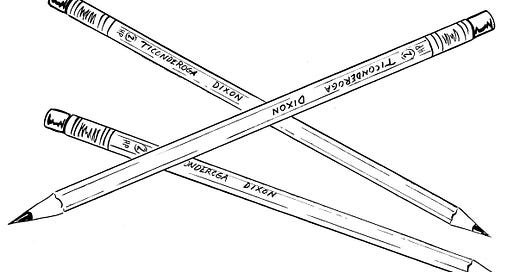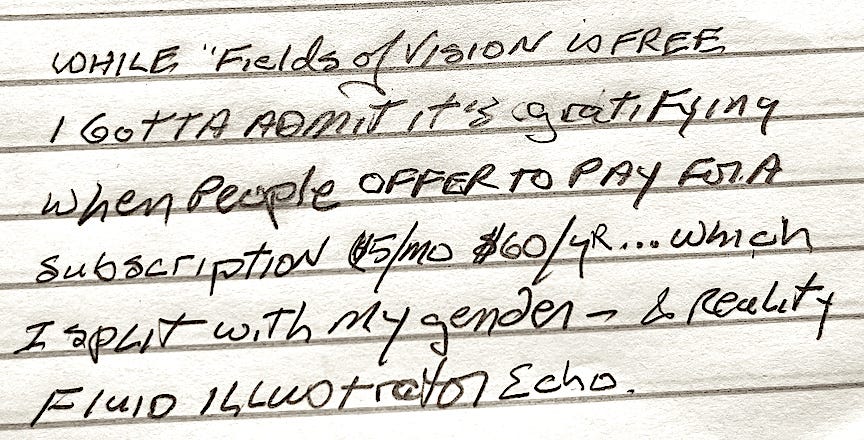I bought a six-pack of good old pencils at Staples the other day. I didn’t open it for days. Just looking at them in their pristine fully leaded potential made me feel the way I would if I knew the apocalypse was coming and I had a dozen hermetically sealed loaves of bread and a 90-day supply of my meds.
I have mixed feelings about pencils. Like many lefties, during elementary school, I developed a contorted crab-like hand position to (unsuccessfully) avoid leaving a trail of smears on spelling tests, multiplication exercises, and the edge of my hand. But when you need to make tentative margin notes on the hard copy of a group document, do crossword puzzles, or write down secret codes—and you don’t have any invisible ink around—nothing beats a good old-fashioned Dixon Ticonderoga #2 with a nice pink eraser.
Currently, my day job is writing about Henry David Thoreau. At first, I wasn’t particularly fond of him. I figured anyone who threw 3 million words against the wall was bound to hit a few good one-liners. But the more I’ve learned, the more I’ve started to kind of like the guy. First, while I’m no expert, I suspect that—in modern terms—he was both neuro-diverse and gender fluid: “I love men with the same distinction that I love woman1 as if my friend were of some third sex,” he once wrote.
He also proved you can change the world by living simply and writing relentlessly.
Thoreau famously built a little writing cabin on Walden Pond, a mile from his family home in Concord, Massachusetts. He wanted peace and quiet to write his mournful meditation/travelogue about the trip he and his late brother John took up the Concord and Merrimack Rivers. But, while writing that book, he also jotted down observations, drawings, and reflections that would provide the raw material for a book that would make him the patron saint of the environmental movement even though, contrary to “common knowledge,” he only lived in the cabin for two years, two months, and two days.
About a year into Thoreau’s time at Walden, he was in town, on his way to the cobbler to have his shoes mended, when he was stopped by his friend, occasional fishing partner, and town tax collector Sam Staples (that’s right… his last name was “Staples”). Sam politely asked Henry to pay the three years in back poll taxes he owed. A total of about $5. Sam even offered to pay the taxes for him. (He just wanted to clean up the books before he retired.) But it was a matter of principle for Henry. He refused to pay taxes to a government that supported slavery. So, he spent a night in jail and ended up writing a short book about his rationale for doing so that changed the lives of several famous leaders of protest movements—both non-violent ones such as Mahatma Gandhi and Martin Luther King and those more anarchistically inclined like Emma Goldman and Malcolm X.2
That kind of influence? From two years in a cabin and one night in jail and two books that a lot of people have trouble reading? That’s remarkable. Too bad he didn’t live long enough to see what he’d achieved. His books barely sold at all in his lifetime.
But what I find most interesting about Henry is that, from time to time, he worked at his dad’s pencil factory. There, he figured out how to mill finer graphite and mix in different amounts of clay to make pencils of various hardness. For a while, the company’s pencils were considered the best in the country, rivaling the famous French models.
In the process, he developed a pencil that neither rain, nor snow, nor sleet, nor hail could keep him from his self-appointed task of jotting down encyclopedic observations of nature. For him, the pencil was so part and parcel of who he was that when he made a detailed list of supplies for a trip to Maine—down to the last matchstick and sewing needle—he didn’t mention pencils. He always carried a pencil.
While Thoreau used a quill pen and ink for his final manuscripts, he made detailed drawings, took obsessively meticulous notes, and wrote drafts of books and essays in pencil.
In deference to Henry, I wrote the first draft of this essay with a pencil—the first time I’ve done that in a very long time. I hadn’t realized how different the act of writing and erasing with a pencil was from cutting and pasting—or even writing and crossing out with a pen. Twirling over a pencil, rubbing out words, and twirling it back to write new ones, makes writing and erasing feel like two sides of the same creative coin.
Computers might help us write a lot faster (and fix our typos in the process). Pens might be mightier than swords. But, as Thoreau proved, the “lowly” pencil has just as much power to change the world.
This is not a typo. He wrote “men” plural but “woman” singular. It would seem that, for Henry, “men” were individuals whereas “woman” was an ideal. (Which would seem to be a fairly significant “distinction.”)
Another bit of incorrect “common knowledge” about Thoreau is that he was only into non-violent protest. He was actually a big fan of John Brown and his use of lethal force at Harper’s Ferry to incite a revolt to end slavery.







Yes, they assume his aunt paid it. But he did spend his night in jail although when he got out he did go to the cobbler! One reason he was protesting the war was that it would open up new territories to slavery. Thanks for reading so closely!
I work on the road as an artist who creates conservation-restoration projects and I live simply. Cheers to the power of pencils and to Thoreau and you! A friend gave me a signed print (signed by Don Henley of the Eagles) when he was helping to save Walden Pond.